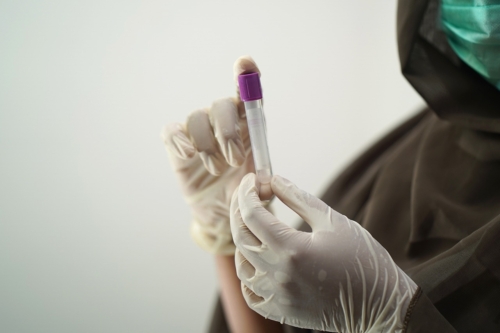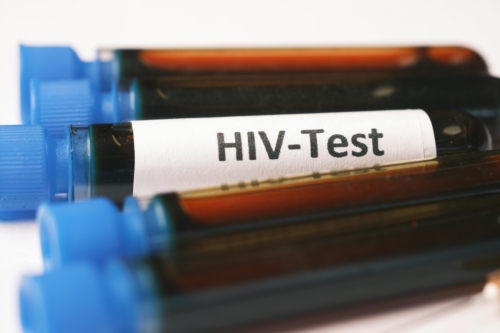
Curry County Man accused of trying to spread HIV through sex
GOLD BEACH, Ore. — Deputies arrested a Gold Beach man last week following a report that he was “spreading or attempting to spread” the Human Immunodeficiency Virus (HIV) through sex without telling his partner.
According to the Curry County Sheriff’s Office, deputies took James Allen Propes into custody shortly after 1 p.m. last Thursday. The Sheriff’s Office had received a complaint “months prior” claiming that Propes had been knowingly trying to spread the disease.
Court records show that Propes has been charged with both first and second degree attempted assault by “manifesting extreme indifference to the value of human life” in potentially transmitting HIV without notifying the other person. The same document also claims that Propes had been on parole at the time, and had “engaged in persistent involvement in similar offenses” unrelated to this particular case.
“Due to the risk to public health, the Curry County Sheriff’s Office is asking anyone with information about this case or who may have had consensual contact with Propes to contact Curry County Sheriff’s Detectives at 541-247-3242 x4,” the agency said in a statement.
Contemporary news reports and court records indicate that Propes faced similar charges in Oregon back in 2012 and was convicted, then faced more charges in Georgia in 2016 before being sentenced to 10 years in prison.
A decision furnished by the Georgia Court of Appeals on June 1, 2018 overturned Propes’ conviction in Georgia because the prosecution did not present any concrete proof of Propes’ HIV-positive status — i.e. an approved medical test confirming that status. While law enforcement in both Oregon and Georgia provided evidence that Propes admitted he had HIV, the Appeals Court determined that this was not sufficient.
At his Curry County arraignment on July 26, Propes reportedly got up and walked out of the room and had to be ordered to return. He was found in contempt of court, with his bail set at $1 million.
Court of Appeals of Georgia. PROPES v. THE STATE - concludes that the State failed to meet its burden to prove Propes's HIV positive status under OCGA § 16-5-60
A18A0549
Decided: June 01, 2018
ELLINGTON, P. J., BETHEL, J., and SENIOR APPELLATE JUDGE PHIPPS
A Gwinnett County jury found James Propes guilty beyond a reasonable doubt of a violation of OCGA § 16-5-60 (c), which prohibits certain conduct by HIV infected persons. Specifically, the jury found Propes guilty of, after obtaining knowledge of being infected with HIV, knowingly engaging in sexual intercourse without disclosing to the other person the fact of his being an HIV infected person prior to that intercourse. Following the denial of his motion for a new trial, Propes appeals, contending inter alia, that the evidence was insufficient to support his conviction. For the reasons explained below, we reverse.
1. Propes contends that the State failed to present any laboratory test results or other evidence from which the jury could find that he was an HIV infected person under OCGA § 16-5-60. Based on this, Propes contends that the evidence was insufficient to support his conviction.
“When an appellate court reviews the sufficiency of the evidence, the relevant question is whether, after viewing the evidence in the light most favorable to the prosecution, any rational trier of fact could have found the essential elements of the crime beyond a reasonable doubt.” (Punctuation and footnote omitted.) Rodriguez v. State, 343 Ga. App. 526, 527 (806 SE2d 916) (2017).1 OCGA § 16-5-60 (c) provides, in pertinent part,
A person who is an HIV infected person who, after obtaining knowledge of being infected with HIV[,] ․ [k]nowingly engages in sexual intercourse ․ and the HIV infected person does not disclose to the other person the fact of that infected person’s being an HIV infected person prior to that intercourse ․ is guilty of a felony[.2]
Viewed in the light most favorable to the jury’s verdict, the record shows that the State presented the following evidence at trial regarding whether, at the relevant time, Propes was an HIV infected person:
An investigator for the Hancock County, Indiana prosecutor’s office testified that in February 2012 he was investigating Propes for a case involving failure to warn regarding communicable disease. The investigator testified that his local jurisdiction required him to confirm the HIV status of a suspect before obtaining a warrant for failing to warn. The investigator testified that he sent a subpoena to the Indiana Department of Health for records regarding Propes. In response to his subpoena, the investigator received several documents: an “Affidavit of Custodian of Business Records” attesting that the other documents were made, kept, and used in the ordinary course of business of the Indiana Department of Health; an Adult HIV/AIDS Confidential Case Report issued by the Indiana Department of Health concerning Propes which indicated that he had an HIV infection, a “viral load” of 10,000,000, and a negative “HIV antibody test[ ]” result for “HIV-1/HIV-2 combination EIA”; and two notices issued by HIV Care Coordination, a program of the Indiana Department of Health and signed by Propes in June and July 2012 that under Indiana duty to warn laws “one must notify sex ․ partner(s) of his/her positive HIV or AIDS status prior to ․ [e]ngaging in any sexual acts[.]” After reviewing those documents, the investigator applied for a warrant against Propes for failure to warn regarding communicable disease. During the investigator’s testimony, the trial court admitted the Indiana health department documents over Propes’s objections as State’s Exhibit 1.
An investigator for the Curry County, Oregon Sheriff’s Office testified that he arrested Propes for reckless endangerment and other charges in July 2012. During the investigator’s testimony, the trial court admitted over Propes’s objections the Curry County indictment and guilty pleas to reckless endangerment and attempted assault, which charged him with using bodily fluids containing Human Immunodeficiency Virus as a deadly weapon. No relevant lab reports were introduced during the investigator’s testimony.
The victim named in the indictment in this case testified that in July 2014 she and Propes had a relationship that included sexual intercourse on three occasions. During their sexual encounters, Propes did not wear a condom. The victim testified that he never told her that he was HIV-positive. The victim testified that she learned Propes was HIV-positive after the relationship, when she found two articles about him in an internet search. The victim went to the Gwinnett County Police Department and reported the offense.
A Gwinnett County investigator interviewed Propes. Propes told the investigator that he was HIV-positive and that he had been for about five years. He also admitted that he had sex with the victim, although he averred that it was only once and that he had worn a condom, that he did not tell her that he was HIV-positive, and that he knew he could get in trouble for failing to disclose his positive status to a sexual partner. There is no evidence of any HIV testing beyond that referenced by the investigator who testified about the Indiana arrest.
For purposes of defining the offense of prohibited conduct by an HIV infected person, OCGA § 16-5-60, in subsection (a), incorporates the definitions set out in Georgia’s Health Code in OCGA § 31-22-9.1, which defines “HIV infected person” as “a person who has been determined to be infected with HIV, whether or not that person has AIDS, or who has been clinically diagnosed as having AIDS.” OCGA § 31-22-9.1 (a) (11).3 “Determined to be infected with HIV” means “having a confirmed positive HIV test or having been clinically diagnosed as having AIDS.” OCGA § 31-22-9.1 (a) (7). “Confirmed positive HIV test” means “the results of at least two separate types of HIV tests, both of which indicate the presence of HIV in the substance tested thereby.” OCGA § 31-22-9.1 (a) (5). And “HIV test” is defined as “any antibody, antigen, viral particle, viral culture, or other test to indicate the presence of HIV in the human body, which test has been approved for such purposes by the regulations of the department[,]” that is, the Department of Community Health (DCH). OCGA § 31-22-9.1 (a) (12). See also Rodriguez v. State, 343 Ga. App. at 529.
Reading these definitional sections together, we have held that the State is required to prove, among the other elements, that a defendant was determined to be infected with HIV by an HIV test approved for such purposes by the regulations of DCH. Id. at 529-530 (“[U]nder the uniform rule of strict construction, a penal statute can not be expanded by implication to include conduct or persons not explicitly identified in the statute.”) (punctuation and footnote omitted).4 As in Rodriguez, the record in this case is devoid of any evidence that Propes was determined to be infected with HIV by an HIV test approved for such purposes by the regulations of DCH. See id. at 530 (The only evidence of the defendant’s HIV status was a one-page laboratory testing report that presented only “raw blood data and medical jargon” and did not purport to satisfy the regulations of DCH, the defendant’s postcoital admission to the victim that he was “HIV positive,” and his later admission to investigators that he was HIV positive, neither of which addressed the type of testing done or the approval by DCH.). Id. at 530-531. In Rodriguez, we specifically noted that there was no evidence as to the nature of a lab report admitted by the State or the lab’s compliance with DCH regulations or licensing requirements and no testimony by “a physician or other competent witness to explain the test report; testify as to its origin, methodology, or meaning; or describe how it satisfie[d] the statutory criteria for demonstrating that a person is an HIV infected person under the definitions in OCGA § 31-22-9.1.” (Punctuation omitted.) Id. Because the record in this case suffers from the same deficiencies, we conclude that the State failed to meet its burden to prove Propes’s HIV positive status under OCGA § 16-5-60. Rodriguez v. State, 343 Ga. App. at 531.5
2. Propes’s remaining enumerated errors are moot.
FOOTNOTES
1. See also Jackson v. Virginia, 443 U. S. 307 (99 SCt 2781, 61 LE2d 560) (1979); Rankin v. State, 278 Ga. 704, 705 (606 SE2d 269) (2004).
2. We note that, although the Code Commission titled the Code section “Reckless conduct; HIV infected persons,” the word “reckless” does not appear in the statute. A finding of recklessness is therefore not a separate essential element of the offense.
3. We note that the State has not alleged that Propes has been clinically diagnosed as having AIDS.
4. See also Robin C. Larner, 18 Ga. Jur. Criminal Law § 9:7 (March 2018 update).
5. We note that the State argued on appeal that the evidence, specifically, the documents admitted asState’s Exhibit number one, ․ [,] Appellant’s confession as to knowing he was infected with HIV[,] as well as his previous plea of guilty in Oregon for similar behaviors were admitted for the jury’s consideration. ․ [T]he evidence clearly inculpates Appellant having being HIV infected, having knowledge of his HIV status and not notifying sexual partners of that status prior to engaging in sexual intercourse[.]Although Rodriguez was decided after judgment was entered in this case, it was decided based on the plain meaning of OCGA §§ 16-5-60 and 31-22-9.1, the text of which has not changed in any pertinent way, and it did not constitute a substantive change in any existing case law regarding the essential elements of the offense of prohibited conduct by an HIV-infected person. See Ga. L. 2003, pp. 306-307 (Act No. 54, § 1); Ga. L. 2011, pp., 337, 345, 705, 745, 748 (Act No. 84, § 10, and Act No. 244, § 6-3); Ga. L. 2016, pp. 752-754 (Act No. 568, § 3). Accordingly, there is no issue regarding whether our decision in this case constitutes impermissible retroactive application of a change in the law after entry of judgment. See Hammond v. State, 289 Ga. 142, 143 (710 SE2d 124) (2011); Scott v. Hernandez-Cuevas, 260 Ga. 466, 466-467 (1) (396 SE2d 900) (1990).
ELLINGTON, Presiding Judge.
Judgment reversed. Bethel, J., and Senior Appellate Judge Herbert E. Phipps concur.
HIV-Positive Gwinnett Man Convicted Of Reckless Conduct
JX solicited sexual partners on Craigslist without disclosing that he was HIV-positive.
LAWRENCEVILLE, GA — A Gwinnett County man was sentenced to 10 years in prison Friday for soliciting sexual partners online without telling them he is HIV-positive.
JX, 24, was found guilty on two counts of reckless conduct by an HIV-infected person.
According to testimony in his trial, two women came forward last August to say they had had sexual relations with X after meeting via a Craigslist personal ad.
The first woman contacted police after finding a news article stating that he had been arrested and convicted of a similar crime in another state.
X has been charged with similar crimes in Oregon and Indiana. He pleaded guilty in the Oregon case and the Indiana case is still open.
The second woman learned X was HIV-positive after he was arrested.
X never disclosed his medical status to either of the victims, according to testimony.
At his sentencing Friday, Superior Court Judge Tom Davis had harsh words for X.
According to a readout from the District Attorney’s office, Davis said X “is one of two types of people. One … you have decided that you would do whatever it takes to do what you want to have a sexual encounter, or, two, you are an evil person and want to punish others for your illness.”
Davis said he hopes X serves every day of his 10-year sentence and that, if he were able, he would have sentenced X to more time in order to keep the public safe.
The Gwinnett County District Attorney’s office is urging anyone else who had sex with X without being notified he is HIV-positive to contact police.



